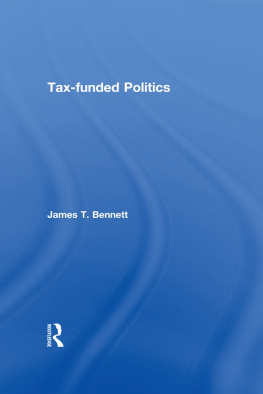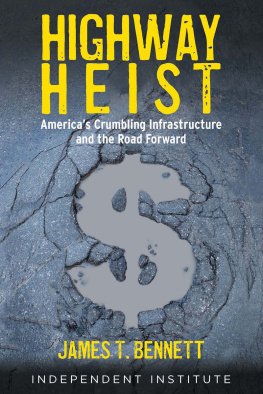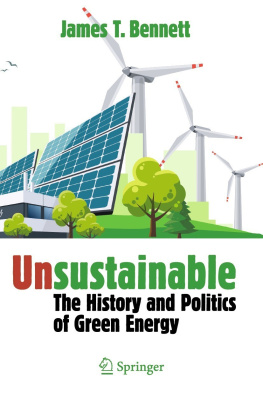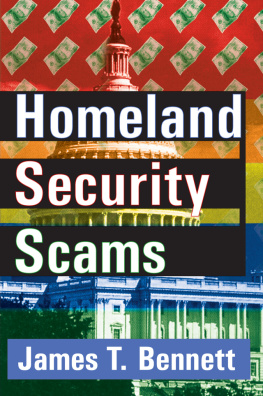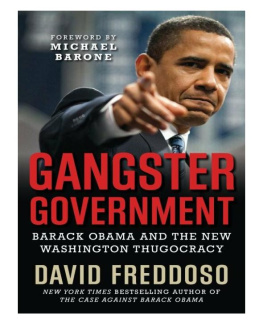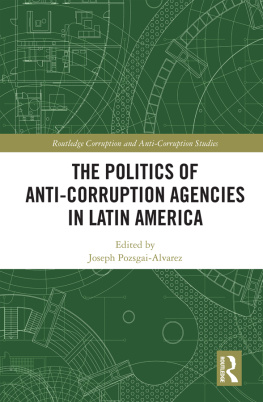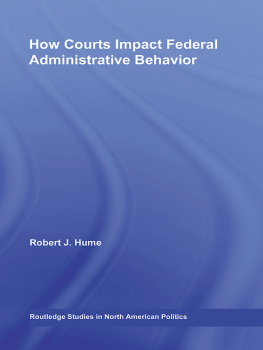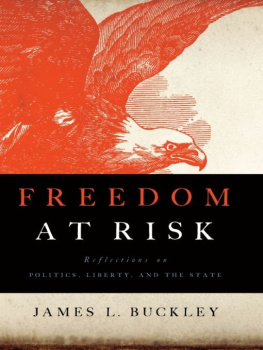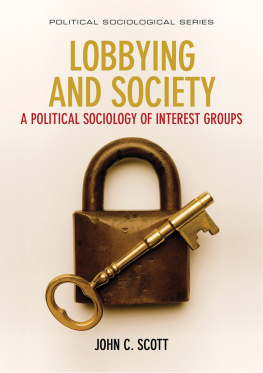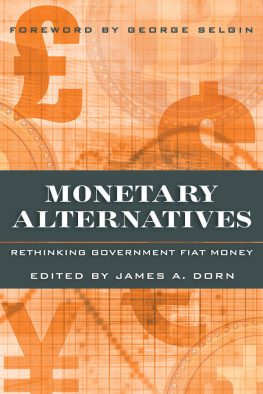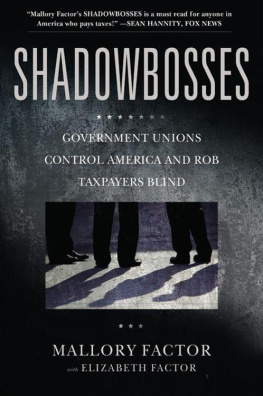Tax-Funded Politics
First published 2004 by Transaction Publishers
Published 2017 by Routledge
2 Park Square, Milton Park, Abingdon, Oxon OX14 4RN
711 Third Avenue, New York, NY 10017, USA
Routledge is an imprint of the Taylor & Francis Group, an informa business
Copyright 2004 by Taylor & Francis.
All rights reserved. No part of this book may be reprinted or reproduced or utilised in any form or by any electronic, mechanical, or other means, now known or hereafter invented, including photocopying and recording, or in any information storage or retrieval system, without permission in writing from the publishers.
Notice:
Product or corporate names may be trademarks or registered trademarks, and are used only for identification and explanation without intent to infringe.
Library of Congress Catalog Number: 2004047899
Library of Congress Cataloging-in-Publication Data
Bennett, James T.
Tax-funded politics / James T. Bennett.
p. cm.
Includes bibliographical references and index.
ISBN: 0-7658-0235-X (alk. paper)
1. LobbyingUnited StatesFinance. 2. Political activistsUnited
States. 3. Nonprofit organizationsUnited StatesPolitical activity. 4.
Grants-in-aidUnited States. 5. Administrative agenciesUnited States
Appropriations and expenditures. I. Title.
JK1118.B3938 2004
322.4'09731
2004047899
ISBN 13: 978-0-7658-0235-4 (hbk)
Ludwig Von Misess classic book, Bureaucracy (Yale University Press, 1944, p. 1), begins with the statements The terms bureaucrat, bureaucratic , and bureaucracy are clearly invectives. They always imply a disparaging criticism of persons, institutions, or procedures. Nobody doubts that bureaucracy is thoroughly bad and that it should not exist in a perfect world. The same may be said of the terms propaganda, propagandistic , and propagandism , for these also have opprobrious connotations, although the dictionary definition according to Websters the spreading of ideas, information, or rumor for the purpose of helping or injuring an institution, a cause, or a personis much less negative. This book is about propaganda financed with taxpayers money. When government becomes involved in advocating ideas and information, issues arise that do not exist when private institutions and individuals espouse a cause.
Americans have always viewed government with considerable suspicion. Government employees are termed civil servants or public servants in recognition of the fact that the powers of government derive from the consent of those governed who are, at least in theory, the masters of the state. From the time of the nations founding, government was intended to serve the will of the people. However, when government promotes ideas, the master/servant relationship is turned on its head, for the power of government is used to influence and create the will of the people rather than passively serve that will. Moreover, relative to institutions in the private sector, the government, especially at the federal level, has very deep pockets to promote its agendas. Because federal law has long prohibited federal employees from directly engaging in lobbying and advocacy activities, nonprofit entities in the private sector are given grants and contracts by governments at all levels to proselytize on behalf of the programs of the agency or government department providing the funding. These private groups are widely viewed as charities that have only the public interest at stake. The halo of charity often disguises the blatantly political role of these organizations.
And, when we also observe that tax dollars are collected coercively, many people would be rightly indignant about the causes being advocated with their money. At root, the central issue in this study is tax-subsidized speech . Freedom of speech itself is not at issue, for that right is guaranteed to all by the U.S. Constitution. This book chronicles and analyzes in detail the links between taxpayers dollars and nonprofit organizations that are actively involved in politics.
I have long had an intense interest in tax-funded politics and in the advocacy activities of those who know whats best for the rest of us. Almost two decades ago, Thomas J. DiLorenzo and I coauthored Destroying Democracy: How Government Funds Partisan Politics (1986), which dealt with the same issues. More recently, four other books co-authored with DiLorenzo, all published by Transaction, deal primarily with how charities are actively engaged in lobbying and political advocacy with taxpayers funds: CancerScam: Diversion of Federal Cancer Funds to Politics (1998), The Food and Drink Police: Americas Nannies, Busybodies, and Petty Tyrants (1999), From Pathology to Politics: Public Health in America (2000), and Public Health Profiteering (2001). Thus, this book is another product of a research emphasis that has engaged my energies and attention for years.
This research would not have been possible without the generous financial support of the Sunmark Foundation and help from the Locke Institute. Research assistance was provided by Mattias Eng, Benjamin Powell, and Brian Rooney. Finally, I owe profuse thanks to my editor, Bill Kauffman, who made major contributions to this study and added some zingers of his own. I am most grateful to these foundations and individuals for their many contributions to this work.
James T. Bennett
George Mason University
Fairfax, Virginia
Introduction: Stuck in the Lobby
Thomas Jefferson, in the Statute of Virginia for Religious Freedom, declared, To compel a man to furnish contributions of money for the propagation of opinions which he disbelieves is sinful and tyrannical.
Now, it may not shock jaded Americans to know that sin and tyranny have their defenders, especially in Washington, D.C., but that doesnt mean that we have to let them carry the day. This Jeffersonian principle is so basic, so powerful in its logic and its appeal to justice, that it seems almost irrefutable. Very few of the organizations mentioned in this book would gainsay Jeffersons declaration. Instead, they just ignore it, or, with an Orwellian twist, they claim to be the partisans of free speech and liberty. Those who would cut off the flow of public monies to such groups are caricatured as mean-spirited right-wingers who would tape shut the mouths of YWCA directors and spunky old folks trying to knock a few bucks off the cost of their prescription drugs.
They will also protest that any criticism of them as lobbyists is errant. After all, such lobbying is against the law. Lobbying with federal monies is illegal, and has been since 1913, but the loophole in this law is wide enough for Al Gore to drive an SUV through. The relevant portion of the 1913 statute reads:
No part of the money appropriated by any enactment of Congress shall, in the absence of express authorization by Congress, be used directly or indirectly to pay for any personal service, advertisement, telegram, telephone, letter, printed or written matter, or other device, intended or designed to influence in any manner a member of Congress, to favor or oppose, by vote or otherwise, any legislation or appropriation by Congress, whether before or after the introduction of any bill or resolution proposing such legislation or appropriation.
Federal regulations governing lobbying since have consumed enough paper to fell the Amazonian rainforests, but the basic problem
Which is to say that the ban on lobbying with federal funds is utterly meaningless. A charitys resources are fungible: money spent in one area may easily be shifted into another area. If, say, the Committee for a Smoke-Free, Alcohol-Free, Drug-Free (and, perhaps consequently, Liberty-Free) World receives a $200,000 federal grant for its anti-smoking programs, the Committee may then transfer $200,000 previously designated for those programs to its lobbying armwhich spends that $200,000 to lobby for additional monies so that it may drag the rest of us into its vice-less utopia.

